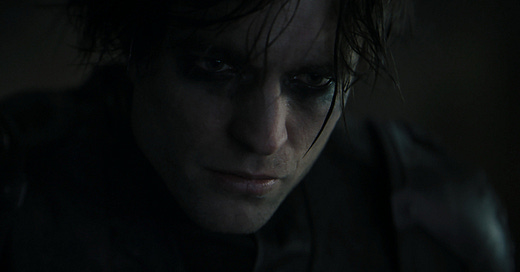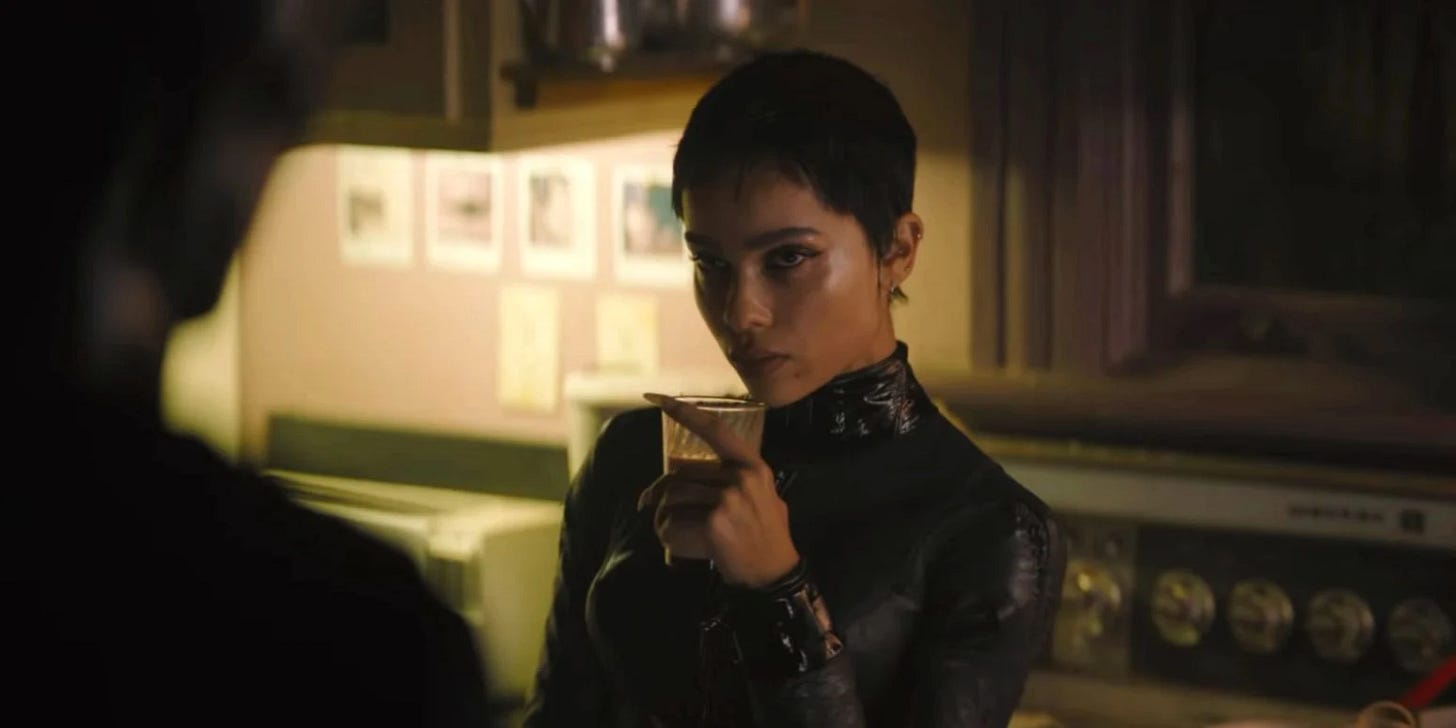Paint It Blacker
on Matt Reeves' dark vision for 'The Batman,' and a Pattinson performance that doesn't go dark enough
Robert Pattinson is never going to escape Twilight. Since his star-making turn as the smoldering vampire Edward Cullen in the first of five adaptations of Stephenie Meyer’s lurid, Mormon-core young adult series, Pattinson has taken great pains to distance himself from the role. In recent years the actor has softened on the Twilight saga. But over that same period, Pattinson has delivered performances of a caliber that make his fear of being typecast as a chaste romantic hero in blockbuster fare understandable. It’s clear that an actor whose performances are forceful, surprising, and sensitive enough to inspire directors like Claire Denis and David Cronenberg to write parts for him doesn’t need to run back to Hollywood for approval or opportunities. So the question becomes, why did he do it for Batman? And what did the makers behind The Batman want that only Pattinson could bring to the character?
A franchise like Batman could really take its pick of the litter of today’s leading men. Every single day it feels like the superhero companies announce that they’ve snatched another great actor out of the talent pool, consigning them to a decade-long sentence of turgid, low energy, green screen snarking. On the same token, Robert Pattinson has quickly established himself as a sought-after presence in the indie world, whose acumen is matched by willingness to take on extraordinarily tough material.
On screen, Pattinson has been menacing and mercurial (The Childhood of a Leader), hunky and stupid (Damsel), horny and insane (The Lighthouse), and much more. But it isn’t range which defines his star persona, because going back even to Twilight, it’s always been clear that in addition to being a great actor, Pattinson is also a star. The single quality that powers the core of star radiance within him is in a word, an inherent mischievousness. There’s an insubordinate gleam that you can’t wipe out of his eye, no matter how hard productions may try to domesticate him with costuming, accents, corseted dialogue, or directional character motivation. What makes him attractive to world-class directors like Denis, who will always reject didactic and safe moralizing in favor of ambiguous, evocative mystery, is a sense that he’s an actor you can never totally control, and a person you can never completely know. There’s a darkness and a depth to Pattinson that he knows how to access, utilize, and conceal, but that he himself at a fundamental level doesn’t completely understand.
You can see why of all the actors, and of all the endless blockbuster franchises out there, that it was Rob who Batman was presented to, and to The Batman that Rob finally relented. Batman has been portrayed by many people in many ways, but he is always at his core dark. No matter his privilege, he was a child of violence, born into a twisted, gritty city by a traumatic event that inflicted a wound upon his spirit. That wound forever nags at him, wincing to be soothed by retaliatory justice. He’s a good guy doing good things, but he may not be doing them for altogether good reasons. Matt Reeves’ The Batman begins and ends by pulling on that loose thread in the Batman mythology: what if he’s no different from the criminals he dauntlessly, lustily pursues? What if the goal isn’t actually justice for his father’s murder, but vengeance for the pain it caused him?
Batman’s first words spoken aloud to other characters, excluding narration, are actually “I’m vengeance.” After he beats down a pack of white-faced ghouls who threatened to punch (just one punch, it seems) a hapless stranger in a desolate subway station, one asks him who he is. After Pattinson croaks about vengeance, Reeves’ camera, which is elsewhere roving, acrobatic, and uber stylish, does something interesting. The camera slowly zooms in, no frills, simply capturing every sickeningly hard punch Batman lands on one last criminal, one who didn’t even hurt the innocent guy. Though Pattinson’s eyes are obscured by the mask and the chic, racoon-liner of kohl that he constantly sports, you can see the bloodlust. He’s enjoying beating a man to near unconsciousness.
Flash to the end of the movie, after Batman, lone good cop Lt. James Gordon (Jeffrey Wright) and an ultracool Catwoman (Zoë Kravitz) kind of (?) foil The Riddler’s (Paul Dano) plan to kidnap, execute, and expose the secrets of every high ranking Gotham city employee. In a slightly cringe, but effective nod to Q-Anon, an imprisoned Riddler convinces his online followers to dress up as him and fire on a captive crowd at Madison Square Gardens. When Batman finally subdues and unmasks the last shooter, a gangly looking regular kid, he too says “I’m vengeance.” It’s a powerful moment of parallelism, a setup hauntingly paid off, one that kicks Bruce into an interesting process of reckoning with his deepest impulses. But these two moments, three hours apart, do not a thematic exploration make. And they’re just an illustration of the major problem with The Batman—they’ve landed a remarkably talented, thrillingly unpredictable, and dark-hearted lead actor, and they’ve created possibly the bleakest, sexiest, and scariest vision of Gotham yet. But Reeves and his team were either unwilling, or unable due to studio influence to follow their dark knight into the black.
The Batman is being called the darkest rendition of this character and this story yet. The violent, Saw-like traps that Riddler ensnares various police chiefs and district attorneys in are certainly disturbing, and Reeves’ visuals are next level. The Batman’s Gotham is like the desolate, trash-infested New York of the ‘70s on oxys—everything jet and concrete, constantly raining, strobing with erotic, death-march EDM and pulsing, blood-red lights. But there is a certain irrepressible altruism, a goody-two-shoes-ness that pervades the film, undercutting its edgier ambitions.
Nowhere is that more apparent than in the character design of Batman/Bruce Wayne. Sad to say, but Robert Pattinson hasn’t been this constrained by a character since Edward Cullen. As with his performance in Twilight, Pattinson shines, gliding around Gotham with the eerie grace of the ghost in Kuroneko, with all the scarred-over bulk of Joaquin Phoenix in You Were Never Really Here. But Reeves ultimately portrays Bruce/Batman as a rule follower, who cherishes all human life, never makes bad decisions, always sticks up for the little guy, and has unwavering respect for authority, even the authority of crooked cops. How do you expect me to buy a character arc which suggests that Bruce is on a downward spiral, losing track of the distinction between justice (good) and vengeance (bad), when he’s only allowed to lose control in a single scene in the first ten minutes? Every other scene shows Batman walking all the other characters back from the brink of chaos and self-destruction, pleading with Catwoman to be rational and kindly sharing his intel with Lt. Gordon. It’s hard to get any sense of interiority out of Pattinson at all, as his out of costume scenes add up to probably ten total minutes.
The greatest loss this inability to go full dark incurs is the loss of the potential Robert Pattinson could have brought to the role. There’s no question that if Pattinson were allowed more control over the role, we’d see squishier, stranger Bruce, and a more brutal, surprising Batman. As it stands, Reeves set the audience up for an arc that caves in at the top, and doesn’t earn its touch down at the denouement. The Batman is without question an achievement of visuals and mood, but it could have reached breathtaking narrative heights if Reeves trusted Pattinson as much as Pattinson trusts himself.






